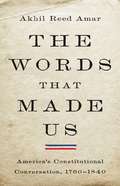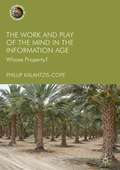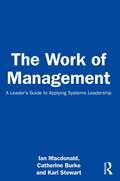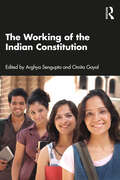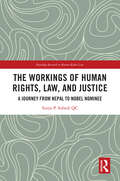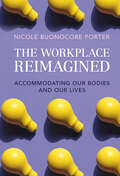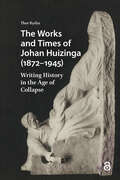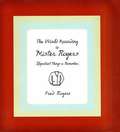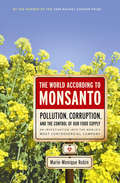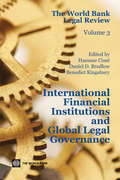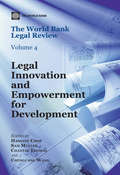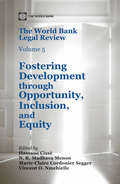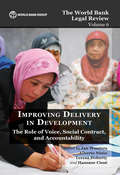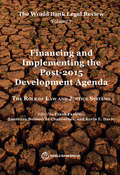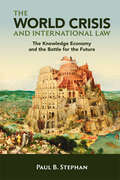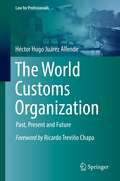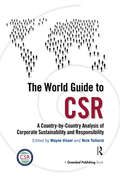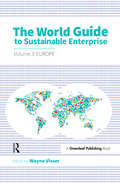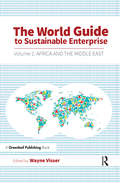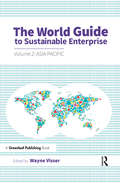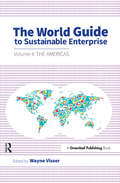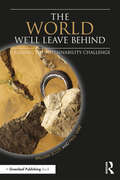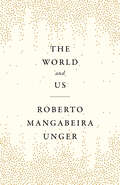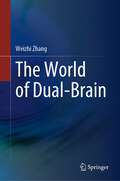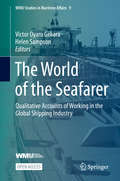- Table View
- List View
The Words That Made Us: America's Constitutional Conversation, 1760-1840
by Akhil Reed AmarA history of the American Constitution's formative decades from a preeminent legal scholarWhen the US Constitution won popular approval in 1788, it was the culmination of thirty years of passionate argument over the nature of government. But ratification hardly ended the conversation. For the next half century, ordinary Americans and statesmen alike continued to wrestle with weighty questions in the halls of government and in the pages of newspapers. Should the nation's borders be expanded? Should America allow slavery to spread westward? What rights should Indian nations hold? What was the proper role of the judicial branch? In The Words that Made Us, Akhil Reed Amar unites history and law in a vivid narrative of the biggest constitutional questions early Americans confronted, and he expertly assesses the answers they offered. His account of the document's origins and consolidation is a guide for anyone seeking to properly understand America's Constitution today.
The Work and Play of the Mind in the Information Age: Whose Property? (Frontiers of Globalization)
by Phillip Kalantzis-CopeThis book tells a series of living stories about a domain of social activity, "the work and play of the mind," in a particular historical epoch: the "information age. " The stories concern political processes and movements as varied as the World Trade Organization's Trade-Related Aspects of Intellectual Property Rights, China's Great Firewall, practices of image sharing in social media, Occupy Wall Street, The Arab Spring, The Alt-Right, and the use of geographical indications by indigenous peoples and farmers to defend their lifestyles. In its theoretical analysis, the book illuminates four alternative political agendas for the work and play of the mind. These four "propertyscapes" represent competing visions for social life, framing projects for collective political action that are at times competing, at times overlapping. The author prompts us to consider whose property is the work and play of the mind, as well as addressing larger questions regarding the framing of political space, the kinds of political communities we may need for the future, and the changing place of the work and play of the mind within these social imaginaries. The book will be of interest to students and scholars across a range of disciplines including media and communications, arts and design, law, politics and interdisciplinary social sciences.
The Work of Management: A Leader’s Guide to Applying Systems Leadership
by Ian Macdonald Catherine Burke Karl StewartThe Work of Management demonstrates how the concepts, models and tools of Systems Leadership can be applied, enabling you to become a more effective manager by improving your own work to create a more positive and effective organisation.Positive organisations, where people come together to achieve a productive and personally satisfying purpose, and which provide the basis for a good society, do not occur by chance. They are created by the work of leaders and members who are dependent upon the way the organisation is designed and operates – its structure and systems. While the theory is explained, this book primarily presents the practical aspects – the specific values, methods and tools – that can be used to improve work and the work performance of direct reports. Building on the bestselling book Systems Leadership, this book provides leaders with a manual for the application of concepts as well as an introduction to Systems Leadership Theory, a method that has been used successfully by businesses from large multinational firms and banks, to SMEs, public agencies and NGOs. It provides a predictive capability, allowing a leader to predict what will work well and what is likely to fail, according to the context. It gives the benefit of foresight as decisions must be made.Designed as a leader’s manual for the application of the concepts around Systems Leadership, this book is for people who want to improve their own, and their organisation’s, work practices and performance.
The Working of the Indian Constitution
by Arghya Sengupta and Omita GoyalThe Indian Constitution has held the country together for 75 years now. This volume demonstrates the Constitution is not a static document and has seen several amendments and interpretations over the years. It delves into how the document has worked for the people since its adoption — its strengths and weaknesses, its many interpretations, how it has influenced and shaped our collectives over time and in turn been shaped by the people.The Indian Constitution clearly vests power in the hands of its people. This volume critically examines how the longest written national Constitution is made successful by people who take its spirit to heart and let it inform their activities, and how like anywhere in the world, it is a work in progress. It covers a range of debates on issues such as individual freedom (of expression, of association, freedom to lead lives of dignity, etc.), liberty (freedom from oppression), the right to life, right to equality, justice, among several others. The book contains essays by judges, lawyers and academics who describe the journey of the Constitution through doctrine, case-law, and comparative analyses with other countries. At the same time, it also contains essays by doctors, politicians, activists, bureaucrats, and a number of methodologically diverse essays by a host of demographically diverse writers.The volume will be an indispensable read for scholars and researchers of legal studies, political scientists, governance, public policy, modern history, and South Asia studies. It will also be of immense interest to political scientists, political theorists, legal scholars, historians, lawyers, and general readers interested in the history of the Indian Constitution.
The Workings of Human Rights, Law and Justice: A Journey from Nepal to Nobel Nominee (Routledge Research in Human Rights Law)
by Surya P. Subedi, QCDrawing on the personal experience of a leading international jurist, this book provides insights into the workings of international law and human rights from a global perspective that transcends the traditional divide between the West and the East, and the Global South and Global North. The work follows the author’s remarkable journey from a simple village in Nepal to becoming an international jurist acclaimed for his innovative academic and influential practical legal work and nomination for the Nobel Peace Prize. It offers insights into the powers bearing on international policymaking, the dynamics of human rights negotiations with governments, and the effects of their outcomes on the lives of their citizens. While much has been written on international human rights law, this inspirational memoir casts a new light on the working of human rights, law, and justice through the eyes of a leading actor. It provides a valuable contribution to the study of justice and human rights and the importance of individual action. As such, the book presents an accessible source for current debates around the development and effectiveness of international law and human rights and practices for decolonising these debates. The book will provide inspiration and practical guidance for students, academics, international lawyers, jurists, and human rights advocates.
The Workplace Reimagined: Accommodating Our Bodies and Our Lives
by Nicole Buonocore PorterIn the wake of the pandemic, many employers continue to allow their employees to work from home, but much of the workplace remains governed by strict structural norms such as shifts, schedules, attendance, and leave-of-absence policies that determine when and where work is performed. In The Workplace Reimagined, Nicole Buonocore Porter explores how these workplace norms marginalize people with disabilities and workers with caregiving responsibilities. Using COVID-19 as a lens to illustrate how entrenched workplace norms are often not inevitable or necessary, Porter theoretically and practically reconceptualizes the workplace to end the stigmatization of these employees and helps readers understand the value of accommodating all workers. The Workplace Reimagined is timely, eye-opening, and will help us realize a workplace in which we account for the reality, the precarity, and the diversity of all our lives and bodies.
The Works and Times of Johan Huizinga: Writing History in the Age of Collapse (Studies in the History of Knowledge)
by Thor RydinThe lifetime of Johan Huizinga (1872-1945) was marked by dramatic transformations in Europe. Cityscapes, aesthetic codes, social orders, political cultures, international travel and means of warfare developed beyond recognition; entire catalogues of hopes and fears were torn asunder and replaced by new ones during not one but two wars. Amidst all these changes, Huizinga grew to become one of the most famous historians of his time. To this day, his works are treated as monuments in the cultural historical field. This book examines how these transformations and 'experiences of loss' affected and informed Huizinga's historical perspectives. Most centrally, this book contends that Huizinga's historical works helped to accommodate and give meaning to his own experiences of uncertainty and rupture, thus offering him a way of life in turbulent times. This project offers an original and comprehensive analysis of an iconic historian writing in the age of collapse.
The World According to Mister Rogers: Important Things to Remember
by Fred RogersFrom the book: There are few personalities who evoke such universal feelings of warmth as Fred Rogers. An enduring presence in American homes for over 30 years, his plainspoken wisdom continues to guide and comfort many. The World According to Mister Rogers distills the legacy and singular worldview of this beloved American figure. An inspiring collection of stories, anecdotes, and insights--with sections titled Understanding Love, The Courage to Be Yourself, The Challenge of Inner Discipline, and We Are All Neighbors--The World According to Mister Rogers is a testament to the legacy of a man who served and continues to serve as a role model to millions.
The World According to Monsanto: Pollution, Corruption, and the Control of Our Food Supply
by Marie-Monique RobinAn investigation of the massive agribusiness company, from a winner of the Rachel Carson Prize: &“Well supported by wide-ranging scientific evidence.&” —Kirkus Reviews The result of a remarkable three-year-long investigation that took award-winning journalist and documentary filmmaker Marie-Monique Robin across four continents, The World According to Monsanto tells the little-known yet shocking story of this agribusiness giant—the world&’s leading producer of GMOs (genetically modified organisms)—and how its new &“green&” face is no less malign than its PCB- and Agent Orange–soaked past. Robin reports that, following its long history of manufacturing hazardous chemicals and lethal herbicides, Monsanto is now marketing itself as a &“life sciences&” company, seemingly convinced about the virtues of sustainable development. However, Monsanto now controls the majority of the yield of the world&’s genetically modified corn and soy—ingredients found in more than 95 percent of American households—and its alarming legal and political tactics to maintain this monopoly are the subject of worldwide concern. Released alongside the documentary film of the same name, The World According to Monsanto is sure to change the way we think about food safety and the corporate control of our food supply.
The World Bank Legal Review
by Hassane Cissé Daniel D. Bradlow Benedict KingsburyThis books focuses on the legal challenges and opportunities for International Financial Institutions in the post-crisis world. It includes contributions from academics, practitioners and Bank staff. The contributions cover a broad array of issues, included governance reform and constitutional framework of IFIs, privileges and immunities, responsibility of international organizations, issues related to fragile and conflict-affected states, climate finance, and the recent financial crisis. The book is organized in three main areas, namely (i) Law of International Organizations: Issues Confronting IFIs; (ii) Legal Obligations and Institutions of Developing Countries: Rethinking Approaches of IFIs; and (iii) International Finance and the Challenges of Regulatory Governance.
The World Bank Legal Review
by Hassane Cissé Sam Muller Chantal Thomas Chenguang WangMuch has been written about the role of law in furthering development. More analysis and debate is needed to understand more fully the true nature of this role. The World Bank Legal Review collects much of this debate and analysis, contributed by scholars and practitioners from around the world. The subtitle of the volume, Legal Innovation and Empowerment for Development, focuses attention on how the law can respond to the challenges posed to development in a world slowly emerging from a protracted economic crisis. Innovation in law means new strategies and ways of thinking about what the law can do in the development realm. Empowerment can mean many things, such as how to place the law into the hands of the poor. The two concepts are linked by their relevance to the future of law as a force for development. This volume contains essays that examine legal innovations and efforts at empowerment worldwide, in individual countries and in the broader international system more generally. Contributions have been collected from scholars and practitioners from across the world. The World Bank Legal Review is an important contribution to the scholarship of law and development.
The World Bank Legal Review
by Hassane CisséThis volume will explore the potentially transformative role of effective laws and legal institutions in providing people with more opportunity that is both inclusive and equitable. Laws, legal frameworks and judicial institutions can create opportunity by providing the space to build human capital and assets, create jobs, and encourage individuals and organizations to make productive investments based on a greater sense of stability. They can also promote inclusion by advancing access to jobs and expanding the reach and quality of services including access to justice as well as promote equity by supporting equal opportunities, promoting open and accountable governance, and effective judicial and legal institutions. The objective is to shift focus to laws, legal frameworks and judicial institutions. To this end, submissions will explore the potentially transformative role of effective laws and legal institutions in providing people with more opportunity that is both inclusive and equitable.
The World Bank Legal Review Volume 6 Improving Delivery in Development
by Alberto Ninio Teresa Doherty Cisse' Jan WoutersMany developing countries have the capacity to develop broad development policy directions and formulate development programs that are logical and consistent, but these do not obtain the desired or targeted results because of challenges in the delivery system. It is increasingly apparent that development efforts must be carefully crafted and targeted in the right way to achieve the most effective results in an efficient manner. Recent literature in development studies evidence the important role of 'delivery' in actualizing positive and efficient development impact. Improving delivery and development impact requires a multidisciplinary approach. Development practitioners devoted to rule of law and justice must conjoin their efforts, concepts, tools and knowledge with experts from various disciplines so as to shape a delivery system that adds economic and social value to ultimate beneficiaries of development. In the foregoing light, the book brings together the diverse perspectives of development experts, international lawyers, academics, researchers, legal practitioners, public and civil servants, and other professionals, in order to explore the values of voice, social contract and accountability, and thereby address the following issue: How can law and justice tools, concepts and knowledge - when anchored in values such as voice, social contract and accountability - shape a delivery system that adds economic and social value to ultimate beneficiaries of development? The book revolves around a discussion of the three values of voice, social contract, and accountability as they relate to the role and function of law, rule of law, justice, judicial systems and other related areas, in delivering development impact. Additionally, the book departs from the legal and includes other multidisciplinary approaches in its discussion of the three values and their impact on delivery in development. The range of issues covered by the book include those relating to human rights, government policy, urban development, resource management, gender, social rights, economic reforms, financial empowerment, opportunity creation, governance, urban law, sustainable development and anti-corruption.
The World Bank Legal Review, Volume 7 Financing and Implementing the Post-2015 Development Agenda: The Role of Law and Justice Systems
by Kevin E. Davis Laurence Boisson de Chazournes Frank FarielloThe newly adopted post-2015 development agenda is centered on 17 sustainable development goals to be reached by 2030. This volume of the World Bank Legal Review looks at how law and justice systems can support the financing and implementation of these goals, including the role of the rule of law and economic and social rights. The contributors, including legal scholars, development practitioners, and financial experts, analyze the goals, explore ways in which they can be achieved, and examine ways that recent relevant law and justice programs have worked. A wide array of topics are covered, from the legal aspects of collecting and monitoring vital data, to improving legal identity programs, to creating innovative health care regulation, to legal and judicial reform, to providing private sector "financing of public education projects to the provision of global public goods. Additionally, a special section on Europe looks at financial crisis management, enforcement of court decisions and the workings of the European Court of Justice. The opportunities and challenges of the 2030 agenda are many. This volume looks at both from multiple perspectives, demonstrating how sustainable development can go forward in a way in which everyone benefits.
The World Crisis and International Law: The Knowledge Economy and the Battle for the Future
by Paul B. StephanThe knowledge economy, a seeming wonder for the world, has caused unintended harms that threaten peace and prosperity and undo international cooperation and the international rule of law. The world faces threats of war, pandemics, growing domestic political discord, climate change, disruption of international trade and investment, immigration, and the pollution of cyberspace, just as international law increasingly falls short as a tool for managing these challenges. Prosperity dependent on meritocracy, open borders, international economic freedom, and a wide-open Internet has met its limits, with international law one of the first casualties. Any effective response to these threats must reflect the pathway by which these perils arrive. Part of the answer to these challenges, Paul B. Stephan argues, must include a re-conception of international law as arising out of pragmatic and limited experiments by states, rather than as grand projects to remake and redeem the world.
The World Customs Organization: Past, Present and Future (Law for Professionals)
by Héctor Hugo Juárez AllendeThis book will take the reader through the past, the present, and into the future of the flagship institution of the international customs community: the World Customs Organization (WCO). The purpose is to present to the reader, in a comprehensive, orderly, and synthetic manner, the enormous contributions that this prestigious and recognized institution has been making to the secure growth of global international trade. In the development of the text, special consideration has been given to the relevant instruments in day-to-day customs work, which constitute the bases of the WCO (the Harmonized System Convention, the Revised Kyoto Convention, and the SAFE Framework of Standards, among many others), as well as those issues that are currently of specific interest to the global customs community (cross-border e-commerce, trade facilitation, and authorized economic operator, to mention but a few), trying to reconcile the various practical aspects of customs operations with their theoretical underpinnings. In the final part, the book turns to the future of customs, analyzing the most pressing challenges presented by technological advances, including the Internet of Things, artificial intelligence, 3D printing, and blockchain. In short, this book will be of great interest to all foreign trade operators, mainly to customs officials, customs brokers, carriers and international forwarding agents, managers of importing and exporting companies, as well as all those (professionals and students) who wish to deepen their knowledge of the exciting world of customs and international trade.
The World Guide to CSR: A Country-by-Country Analysis of Corporate Sustainability and Responsibility
by Nick Tolhurst Wayne VisserThe World Guide to CSR is the first book to provide comparable national profiles that describe the evolution and practice of Corporate Sustainability and Responsibility (CSR) for 58 countries and 5 global regions. Each regional and national profile includes key information about the relevant CSR history, country-specific issues, trends, research and leading organizations. The purpose of the book is to give CSR professionals (including managers, consultants, academics and NGOs focusing on the social, environmental and ethical responsibilities of business) a quick reference guide to CSR in different regional and national contexts. The need for the book is premised on the fact that CSR professionals and researchers more often than not have a multinational remit and are required to benchmark performance internationally, but find that country-specific CSR information is ad hoc, limited or non-existent. Even where national CSR research exists, it is often hidden in academic journals that practitioners cannot access or do not have the time or inclination to read. The book is an edited volume, with expert contributors from around the world, all of whom have been screened and selected on the basis of their qualifications and experience in CSR. Each regional/country profile includes the following subsections:CSR in context Priority issues Trends Legislation and codes Organizations Case studies Educational institutions References This unique resource will be an essential acquisition for all organisations who need to benchmark their CSR strategies throughout different regions and cultures and want the best possible intelligence on the key issues and concerns relating to corporate social responsibility in all of the markets in which they operate.
The World Guide to Sustainable Enterprise - Volume 3: Europe
by Wayne VisserThe World Guide to Sustainable Enterprise is the first comprehensive global compendium that clearly describes the national approaches to sustainable enterprise. Through a systematic review of each country, this quick-to-access reference guide showcases the similarities and differences in each region. Every country profile includes key information about the relevant history, country-specific issues, trends, research, and the leading organizations operating in the field as well as best-practice case studies. The guide comprises four volumes, each dedicated to a specific region of the world. In a world where organizations are working increasingly across national and regional boundaries and research takes a joined-up and international approach, this book is an essential guide for practitioners and researchers in the disciplines of business sustainability, social enterprise and corporate responsibility. The first of its kind, this reference book provides the reader with a unique insight into what is the current state-of-play in each country. Each edited volume provides expert contributions from around the world; the contributors have been selected on the basis of their knowledge of the country and their clear experience in sustainable enterprise. Each regional/country profile includes the following subsections: Sustainable Enterprise in context; Priority issues; Trends; Government policies; Case studies; Further resources; and References. This unique resource will be an essential acquisition for all organizations who need to benchmark their sustainable enterprise strategies throughout different regions and cultures and want the best possible intelligence on the key issues and concerns relating to sustainable business and social responsibility in all of the markets in which they operate. It provides a useful companion reference collection to the World Guide to CSR, also edited by Wayne Visser. The full Four Volume Set of The World Guide to Sustainable Enterprise is available for purchase as a single item at a 25% discounted rate.
The World Guide to Sustainable Enterprise: Volume 1: Africa and Middle East
by Wayne VisserThe World Guide to Sustainable Enterprise is the first comprehensive global compendium that clearly describes the national approaches to sustainable enterprise. Through a systematic review of each country, this quick-to-access reference guide showcases the similarities and differences in each region. Every country profile includes key information about the relevant history, country-specific issues, trends, research, and the leading organizations operating in the field as well as best-practice case studies. The guide comprises four volumes, each dedicated to a specific region of the world. In a world where organizations are working increasingly across national and regional boundaries and research takes a joined-up and international approach, this book is an essential guide for practitioners and researchers in the disciplines of business sustainability, social enterprise and corporate responsibility. The first of its kind, this reference book provides the reader with a unique insight into what is the current state-of-play in each country. Each edited volume provides expert contributions from around the world; the contributors have been selected on the basis of their knowledge of the country and their clear experience in sustainable enterprise. Each regional/country profile includes the following subsections: Sustainable Enterprise in context; Priority issues; Trends; Government policies; Case studies; Further resources; and References. This unique resource will be an essential acquisition for all organizations who need to benchmark their sustainable enterprise strategies throughout different regions and cultures and want the best possible intelligence on the key issues and concerns relating to sustainable business and social responsibility in all of the markets in which they operate. It provides a useful companion reference collection to The World Guide to CSR, also edited by Wayne Visser. The full Four Volume Set of The World Guide to Sustainable Enterprise is available for purchase as a single item at a 25% discounted rate.
The World Guide to Sustainable Enterprise: Volume 2: Asia Pacific
by Wayne VisserThe World Guide to Sustainable Enterprise is the first comprehensive global compendium that clearly describes the national approaches to sustainable enterprise. Through a systematic review of each country, this quick-to-access reference guide showcases the similarities and differences in each region. Every country profile includes key information about the relevant history, country-specific issues, trends, research, and the leading organizations operating in the field as well as best-practice case studies. The guide comprises four volumes, each dedicated to a specific region of the world. In a world where organizations are working increasingly across national and regional boundaries and research takes a joined-up and international approach, this book is an essential guide for practitioners and researchers in the disciplines of business sustainability, social enterprise and corporate responsibility. The first of its kind, this reference book provides the reader with a unique insight into what is the current state-of-play in each country. Each edited volume provides expert contributions from around the world; the contributors have been selected on the basis of their knowledge of the country and their clear experience in sustainable enterprise. Each regional/country profile includes the following subsections: Sustainable Enterprise in context; Priority issues; Trends; Government policies; Case studies; Further resources; and References. This unique resource will be an essential acquisition for all organizations who need to benchmark their sustainable enterprise strategies throughout different regions and cultures and want the best possible intelligence on the key issues and concerns relating to sustainable business and social responsibility in all of the markets in which they operate. It provides a useful companion reference collection to the World Guide to CSR, also edited by Wayne Visser. The full Four Volume Set of The World Guide to Sustainable Enterprise is available for purchase as a single item at a 25% discounted rate.
The World Guide to Sustainable Enterprise: Volume 4: the Americas
by Wayne VisserThe World Guide to Sustainable Enterprise is the first comprehensive global compendium that clearly describes the national approaches to sustainable enterprise. Through a systematic review of each country, this quick-to-access reference guide showcases the similarities and differences in each region. Every country profile includes key information about the relevant history, country-specific issues, trends, research, and the leading organizations operating in the field as well as best-practice case studies. The guide comprises four volumes, each dedicated to a specific region of the world. In a world where organizations are working increasingly across national and regional boundaries and research takes a joined-up and international approach, this book is an essential guide for practitioners and researchers in the disciplines of business sustainability, social enterprise and corporate responsibility. The first of its kind, this reference book provides the reader with a unique insight into what is the current state-of-play in each country. Each edited volume provides expert contributions from around the world; the contributors have been selected on the basis of their knowledge of the country and their clear experience in sustainable enterprise. Each regional/country profile includes the following subsections: Sustainable Enterprise in context; Priority issues; Trends; Government policies; Case studies; Further resources; and References. This unique resource will be an essential acquisition for all organizations who need to benchmark their sustainable enterprise strategies throughout different regions and cultures and want the best possible intelligence on the key issues and concerns relating to sustainable business and social responsibility in all of the markets in which they operate. It provides a useful companion reference collection to the World Guide to CSR, also edited by Wayne Visser. The full Four Volume Set of The World Guide to Sustainable Enterprise is available for purchase as a single item at a 25% discounted rate.
The World We'll Leave Behind: Grasping the Sustainability Challenge
by William Scott Paul VareIt is now clear that human activity has influenced how the biosphere supports life on Earth, and given rise to a set of connected environmental and social problems. In response to the challenge that these problems present, a series of international conferences and summits led to discussions of sustainable development and the core dilemma of our time: How can we all live well, now and in the future, without compromising the ability of the planet to enable us all to live well? This book identifies the main issues and challenges we now face; it explains the ideas that underpin them and their interconnection, and discusses a range of strategies through which they might be addressed and possibly resolved. These cover things that governments might do, what businesses and large organisations can contribute, and the scope for individuals, families and communities to get involved. This book is for everyone who cares about such challenges, and wants to know more about them.
The World and Us
by Roberto Mangabeira Unger"A restless visionary striving to realize the highest aspirations of modernity itself."–New York TimesA radical re-envisioning of the human condition by the acclaimed Brazilian philosopherIn The World and Us, Roberto Mangabeira Unger sets out to reinvent philosophy. His central theme is our transcendence, everything in our existence points beyond itself, and its relation to our finitude: everything that surrounds us, and we ourselves, are flawed and ephemeral.He asks how we can live so that we die only once, instead of dying many small deaths; how we can breathe new life and new meaning into the revolutionary movement that has aroused humanity for the last three centuries, but that is now weakened and disoriented; and how we can make sense of ourselves without claiming for human beings a miraculous exception to the general regime of nature. For Unger, philosophy must be the mind on fire, insisting on our prerogative to speak to what matters most.From this perspective, he redefines each of the traditional parts of philosophy, from ontology and epistemology to ethics and politics. He turns moral philosophy into an exploration of the contest between the two most powerful contemporary moral visions: an ethic of self-fashioning and non-conformity, and an ethic of human connection and responsibility.And he turns political philosophy into a program of deep freedom, showing how to democratize the market economy, energize democratic politics, and give the individual worker and citizen the means to flourish amid permanent innovation.
The World of Dual-Brain
by Weizhi ZhangThis book leaves the template of the inertia of natural human society and traditional ideological thinking, to illustrate the mechanism of the generation of the Sociality Brain and to explore the construction path of the human-computer symbiosis order. At the same time, this book proposes concepts including ‘wisdom sharing system’, ‘the Sociality Brain’, ‘dual-brain world’, ‘off-site economic civilization’, ‘basic contradictions in the intelligent world’, and ‘class analysis and division of the dual-brain world’, etc. This is a philosophical thinking about the intelligent world beyond the categories of natural human society and biological brain.
The World of the Seafarer: Qualitative Accounts of Working in the Global Shipping Industry (WMU Studies in Maritime Affairs #9)
by Victor Oyaro Gekara Helen SampsonThis open access book constitutes an ethnographic mosaic which depicts the contextual complexities of the life and work of seafarers who are employed in the international merchant cargo fleet. The collection is based upon the observations and interviews of researchers in multiple disciplines. It is woven together to offer a richly detailed insight into the ways in which a complex global industry operates internationally. The book covers issues to do with career decisions and recruitment, gender, life and work on board multinational vessels, health and safety issues, the regulation of the industry, shipboard roles and role conflict, and the representation of workers. It will be of considerable interest to all students globally who are studying for professional seafaring qualifications, to graduate students studying for masters courses in ship and port management, and to welfare professionals and policy makers. It is of special interest to those connected to the shipping industry who specialize in issues relating to 'the human element' and will serve as a paradigm defining text in this area.
